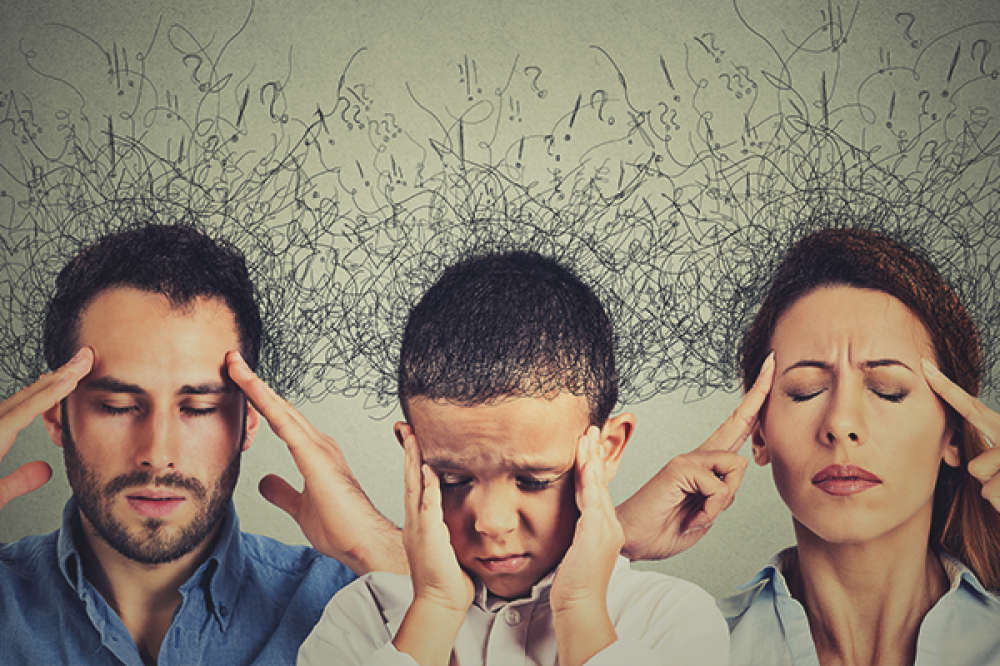“In the medical system there are other prevention models, like dental care, where we go every six months for a cleaning. I think adopting that kind of model — a mental health checkup, a prevention model for folks who are at risk — is I think where we need to go next.”3 – Dr. Golda Ginsburg
About 10% of young children and adolescents in the US experience an anxiety disorder1. Anxiety disorders can run in families; children’s risk for developing problems with anxiety, and being diagnosed with an anxiety disorder, is increased if their parents are diagnosed with an anxiety disorder2.
Learn more about relationships and mental health.
This can be terrifying thought for parents, especially parents who are already struggling with anxiety. It is important to be aware that just because a child may be more at risk of developing an anxiety disorder does not mean that they actually will develop a disorder.
Research suggests that the genetic contribution from a parent to a child is modest, and likely indirect2. Environmental factors (such as poverty or community violence) and parenting factors (such as parental over-control or critical communication), which are changeable, are known to have a much more direct effect on child mental health2.
While it can be scary and painful to think of our children at risk of developing an anxiety disorder, anxiety is treatable, and there is a new family-based treatment that may help prevent the onset of an anxiety disorder in children at higher risk. This is encouraging as most anxiety-prevention programs for children and youth thus far have been delivered in schools to all children, who may or may not be at increased risk of developing an anxiety disorder. These interventions have been modestly effective, but there has been room for improvement, and a need to deliver more targeted prevention programs to children at higher risk. In addition, the school-based approach does not address the family functioning or parent mental health, which are known to influence child mental health.
The treatment, developed by Dr. Golda Ginsburg at John’s Hopkins University, examined the impact of an 8-week family-based CBT treatment for anxiety. Called the Coping and Promoting Strength (CAPS) Intervention, the treatment was delivered in eight 60-minute sessions to all interested family members. This meant that some sessions both parents and children attended; other sessions only the anxious parent attended with the child. CAPS sessions taught coping strategies to directly target child risk factors for anxiety, such as:
-
- avoidance of meaningful life activities due to fear
- unhelpful thinking habits
- poor problem solving skills.
CAPS sessions also directly targeted family-level risk factors, such as enhancing effective communication between parents and children, reducing parental modeling of anxiety, and reducing over-controlling and over-protecting parenting behaviors.
To be involved in the study, at least one biological parent in each family had to have anxiety symptoms severe enough to meet criteria for a diagnosis of an anxiety disorder. Children, at the time the study started, could not already have a diagnosis of an anxiety disorder because they wanted to understand how to prevent the onset of an anxiety disorder. Anxiety symptoms were assessed throughout the study, and then at 6 and 12 months post-intervention. 136 families were involved; half were assigned to the CAPS intervention, and half were assigned to a control group. Families in the control group were provided educational information about anxiety disorders, but no CBT coping skills or therapy.=
Results showed very promising effects for the CAPS intervention. Only 5% of children in the CAPS group developed an anxiety disorder over the course of the year, compared to 31% in the control group. In addition, children in the CAPS group reported lower anxiety symptoms at all assessment points, including the 6 and 12-month follow-up, compared to the control group. Researchers also wondered: what are the parts of this treatment that are actually causing a reduction in the children’s anxiety symptoms over the course of treatment? Researchers found that decreases in parents’ overall distress (not just anxiety), and decreases in parents’ modeling of anxiety, accounted for the decreases in child’s anxiety at the 12-month follow-up.
These results provide very promising evidence that through developing new coping skills, families can promote the health of their children at risk for developing problems with anxiety, and potentially prevent the onset of an anxiety disorder in their children. These results also highlight the importance of boosting parental mental health as a way to boost child mental health.
Developing a prevention model is what Dr. Ginsburg and her research team are doing, and the results are very promising. Hopefully, this prevention program will continue to get tested are larger groups of families, and become accessible to more families and children at risk of developing an anxiety disorder.
Sources
1. Costello J, Egger H, Copeland W, et al: The developmental epidemiology of anxiety disorders: phenomenology, prevalence, and comorbidity, in Anxiety Disorders in Children and Adolescents, 2nd ed. Edited by Silverman K, Field P. Cambridge, UK, Cambridge University Press, 2011, pp 56–75.
2. Drake, K. L., & Ginsburg, G. S. (2012). Family factors in the development, treatment, and prevention of childhood anxiety disorders. Clinical Child and Family Psychology Review, 15(2), 144-162. doi:10.1007/s10567-011-0109-0
3. http://www.npr.org/sections/health-shots/2015/09/25/443444964/parents-can-learn-how-to-prevent-anxiety-in-their-children?utm_source=facebook.com&utm_medium=social&utm_campaign=npr&utm_term=nprnews&utm_content=20150925
Ginsburg, G. S., Drake, K. L., Tein, J., Teetsel, R., & Riddle, M. A. (2015). Preventing onset of anxiety disorders in offspring of anxious parents: A randomized controlled trial of a family-based intervention. The American Journal of Psychiatry, 172(12), 1207-1214. doi:10.1176/appi.ajp.2015.14091178
Sarah Krill Williston is a PhD Candidate in the Roemer lab at the University of Massachusetts Boston. Sarah’s research primarily focuses on developing strategies to increase mental health literacy and reduce mental health stigma, to empower individuals to more effectively seek evidence-based mental health care for anxiety and trauma-related disorders. In addition, Sarah’s clinical interests include providing evidenced-based treatments (primarily CBT, ABBT) to individuals with mood, anxiety and trauma-related disorders, with a particular interest in working with military families, active duty service members, and veterans.



